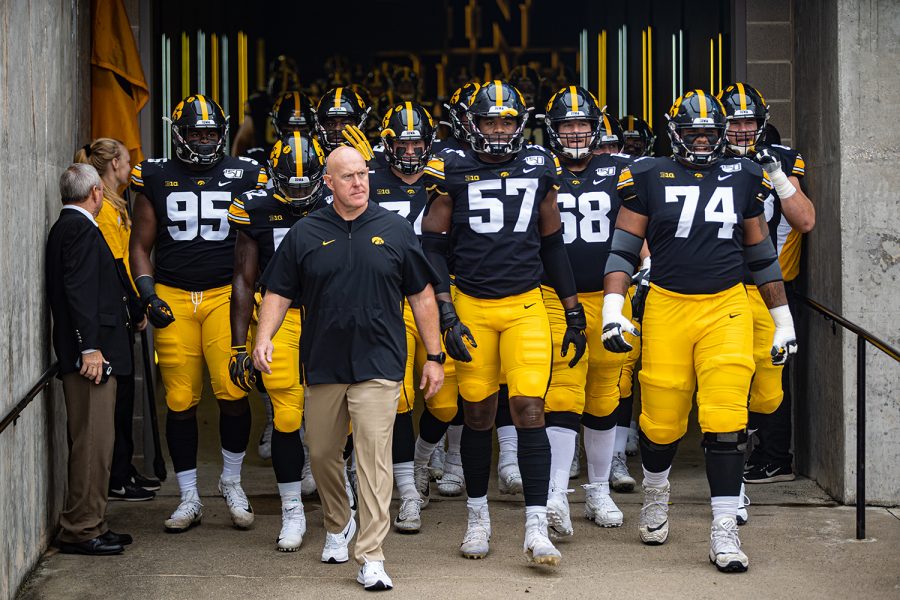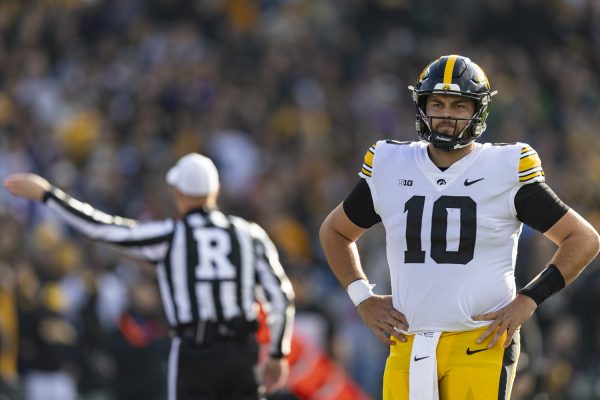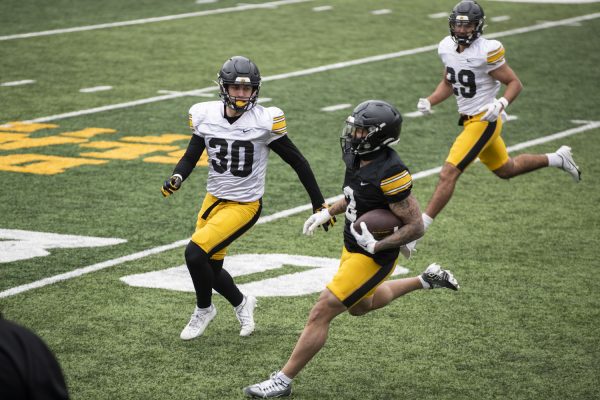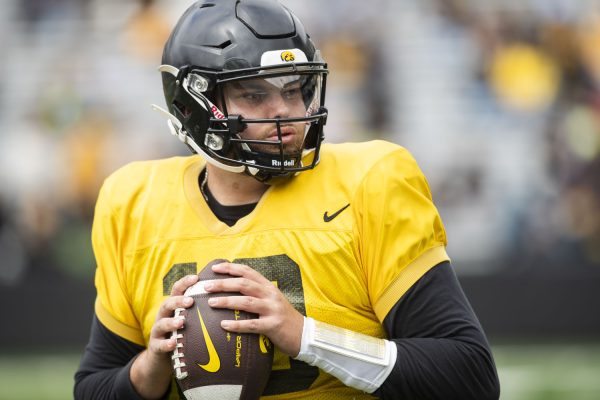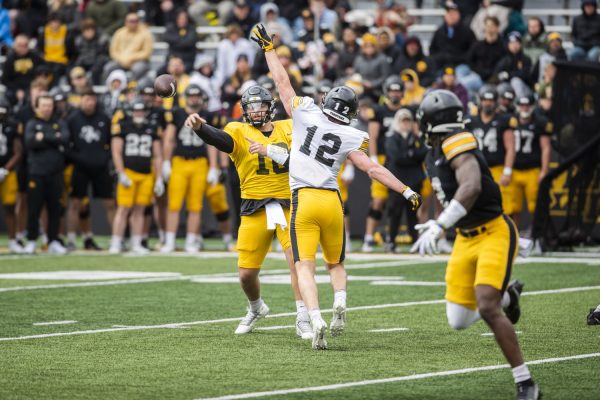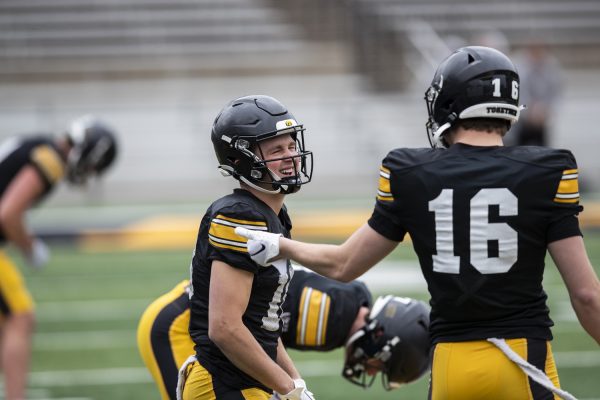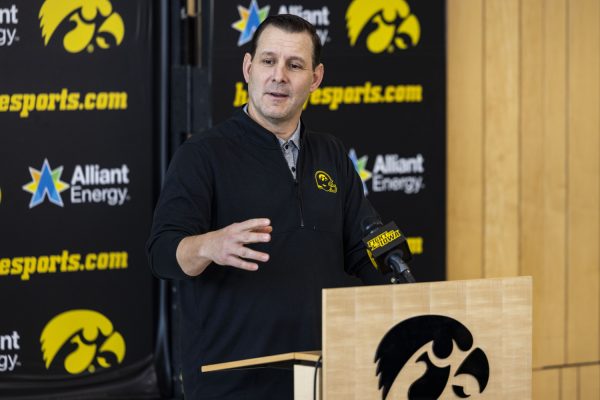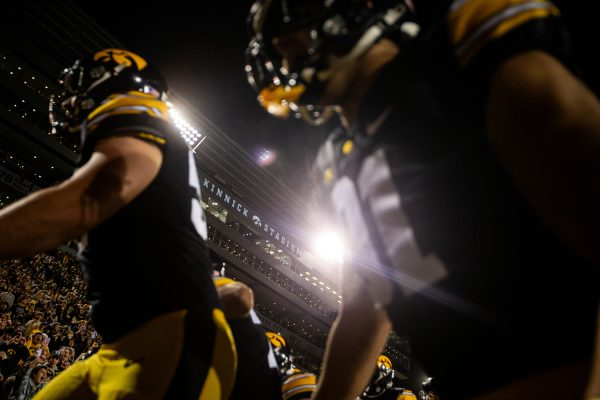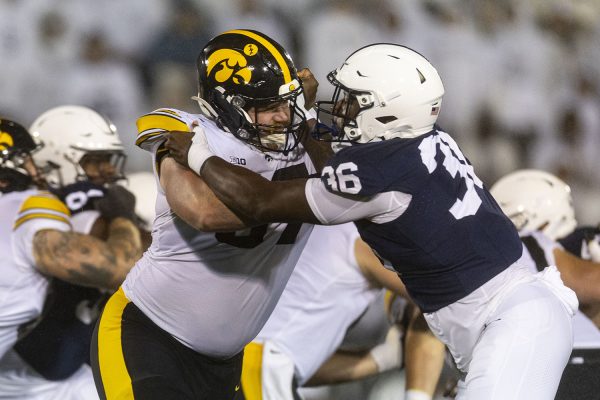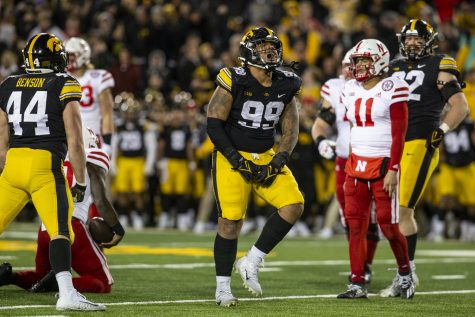Chris Doyle resigns from Jacksonville Jaguars one day after being introduced
The Jaguars faced public backlash after Doyle was formally introduced as a member of Jacksonville’s staff on Thursday.
Iowa players walk out of the tunnel before a football game between Iowa and Middle Tennessee State at Kinnick Stadium on Saturday, September 28, 2019. The Hawkeyes defeated the Blue Raiders, 48-3. (Shivansh Ahuja/The Daily Iowan)
February 13, 2021
Chris Doyle’s tenure with the Jacksonville Jaguars lasted only one day.
After Doyle was introduced as the team’s new Director of Sport Performance on Thursday, and the public backlash that followed, first-year NFL head coach Urban Meyer announced Friday night that Doyle has resigned.
“Chris Doyle came to us this evening to submit his resignation and we have accepted,” Meyer said in a statement. “Chris did not want to be a distraction to what we are building in Jacksonville. We are responsible for all aspects of our program and, in retrospect, should have given greater consideration to how his appointment may have affected all involved. We wish him the best as he moves forward with his career.”
Doyle, the former Iowa football strength coach, was on the Hawkeye coaching staff for 21 years before reaching a separation agreement with the University of Iowa on June 15 amid allegations of racism and mistreatment from former players.
Meyer said after Doyle’s hiring Thursday that he, general manager Trent Baalke, and owner Shahid Khan had “vetted [Doyle] thoroughly” before making the hire.
The Fritz Pollard Alliance, an organization devoted to championing diversity in the NFL, blasted the Jaguars and Meyer for Doyle’s hiring earlier on Friday. Executive director Rod Graves released a statement calling Doyle’s hiring unacceptable and a sign of the systemic hiring problems in the NFL.
“At a time when the NFL has failed to solve its problem with racial hiring practices, it is simply unacceptable to welcome Chris Doyle into the ranks of the NFL coaches,” Graves’ statement reads. “Doyle’s departure from the University of Iowa reflected a tenure riddled with poor judgment and mistreatment of Black players. His conduct should be as disqualifying for the NFL as it was for the University of Iowa.
“Urban Meyer’s statement, ‘I’ve known Chris Doyle for close to 20 years’ reflects the good ol’ boy network that is precisely the reason there is such a disparity in employment opportunities for Black coaches.”
Doyle’s hiring was met with widespread criticism.
Chris Doyle’s workouts put 13 Iowa players in the hospital. He wasn’t fired. He got an award & became CFB’s highest-paid strength coach.
Doyle was accused of racial bias by multiple Black players. He got a $1.1 million separation package & only took 8 months to find a new job. https://t.co/vritP8sAQg— Rodger Sherman (@rodger) February 11, 2021
Urban Meyer’s hiring of Chris Doyle is an example of why I praised Bruce Arians for the diversity of his staff. It’s more than ok to be accused of racism and bullying of college student athletes because as Urban said he’s “known Chris for close to 20 years”. Get mad. Don’t care
— Ryan Clark (@Realrclark25) February 12, 2021
“How tone-deaf do you have to be to hire a guy in this time in the country, in this league, with the things we’ve been dealing with.”
Marcus Spears and the NFL Live crew were vocal and candid about their disappointment in Jacksonville’s hiring of Chris Doyle. pic.twitter.com/jdD1TUFcgn
— Awful Announcing (@awfulannouncing) February 11, 2021
“All that energy that I had for [Urban Meyer] in Jacksonville is gone. … It’s tone deaf as far as I’m concerned.”@keyshawn on Urban Meyer defending the decision to hire controversial strength coach Chris Doyle. pic.twitter.com/Fuom7jyntW
— First Take (@FirstTake) February 12, 2021
I’m really disgusted by this.
The clear msg is that not only does Meyer not care whether Doyle is guilty of racial bias, he also doesn’t care whether the team’s black coaches & players– including Greg Maybin who played at Iowa under Doyle–feel comfortable & respected there. https://t.co/wgyWrYNpRt
— Sarah Spain (@SarahSpain) February 12, 2021
Urban Meyer should not hire Doyle and the media, the league, the players the fans and the Fritz Pollard group should not be quiet until this is undone. We can’t pretend to be making progress and let this stand.
— Joe Banner (@JoeBanner13) February 12, 2021
Football coaches build their careers off black talent tolerate racism and harbor racists. They will tell you how many kids they saved or helped, gave an opportunity to or got off the streets _ like they weren’t doing it to win.
Some will denounce racism but won’t be anti-racist. https://t.co/39PcvMTJWx— Clarence Hill Jr (@clarencehilljr) February 12, 2021
Urban Meyer could have picked any coach he wanted for this position but picked someone accused of abuse and racism. https://t.co/VFyYGCyrHF
— mike freeman (@mikefreemanNFL) February 11, 2021
On June 5, dozens of former Iowa football players started to speak out with allegations detailing the racist and demeaning behavior they claimed to have experienced in their time as Hawkeyes. Doyle was mentioned by name by several players.
After previously placing Doyle on administrative leave, the UI announced a separation agreement with Doyle on June 15. As part of the agreement, Doyle, whose salary of over $800,000 in 2019 was the highest of any strength coach in college football, received $1.1 million.
The allegations made by former players prompted the UI to hire the law frim Husch Blackwell to conduct an investigation into the Hawkeye football program. The firm’s report of its findings, released in July, stated that the program’s rules “perpetuated racial or cultural biases and diminished the value of cultural diversity,” and that the program over-monitored players to the point that they experienced heightened anxiety and maintained a culture that allowed a “small group of coaches” to demean players.
Doyle was the only staff member removed from the program as a result of allegations from former players.
Doyle and Iowa head coach Kirk Ferentz are among the defendants in a lawsuit filed by 13 Black former Iowa football players in November. These players claim they faced “targeted and discriminatory behavior” in their time with the Iowa football program.



